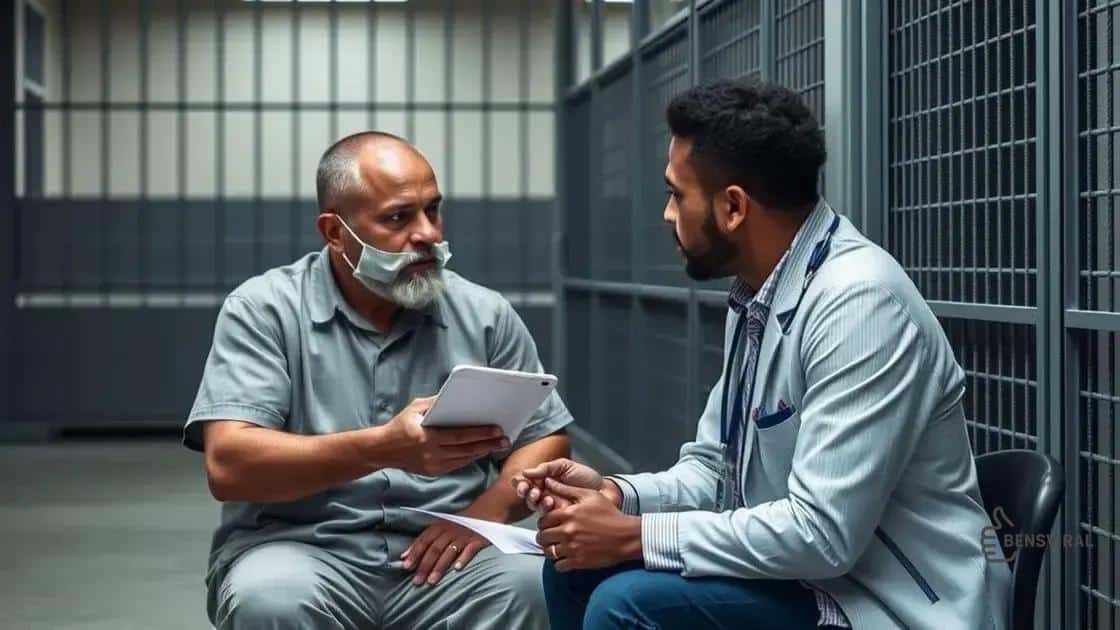Oversight of financial services for incarcerated individuals: a neglected issue

The oversight of financial services for incarcerated individuals is crucial for ensuring fair access to resources, and advocacy groups play a vital role in providing education and support to facilitate successful reintegration.
Oversight of financial services for incarcerated individuals is often overlooked, yet it’s crucial for ensuring fair treatment and access to resources. Have you ever considered how this impacts their lives?
Understanding the financial challenges faced by incarcerated individuals
Understanding the financial challenges faced by incarcerated individuals is essential for fostering equality and justice. Many people may not realize how being incarcerated affects an individual’s financial standing and their ability to manage it.
Financial issues emerge quickly during incarceration. In many cases, individuals lose their jobs, which often leads to a complete disruption of their income. Without funds, they can struggle to pay for essential expenses, such as family support or legal fees. This can create a cycle of hardship that is difficult to break.
Key financial challenges include:
Loss of income: When a person is incarcerated, they typically lose their regular salary. This loss can lead to difficulties in meeting basic needs.
Debt accumulation: Incarcerated individuals may still be responsible for existing debts, such as loans or child support. Accumulating fees or interest during their time in prison can make it even harder to manage once released.
Consequences of financial instability:
- Increased stress and anxiety about financial obligations.
- Difficulty reintegrating into society due to financial barriers.
- Limited access to necessary resources, such as housing and employment.
As you can see, the implications of these challenges ripple through many aspects of life. Navigating financial services becomes increasingly complicated for individuals upon release. Many often face a lack of understanding regarding their options and the best practices for managing their finances in a post-incarceration environment.
Additionally, financial literacy is not always easily accessible. Many incarcerated individuals do not receive adequate education on managing their finances. This leaves them vulnerable to exploitation by predatory financial services that can worsen their situations instead of helping them.
Understanding these financial barriers is critical to developing effective solutions. Advocacy for better financial resources and education for incarcerated individuals can lead to positive outcomes in their lives. By shedding light on these serious issues, we can work towards a more just system that truly supports reentry into society.
Existing oversight mechanisms for financial services
Understanding existing oversight mechanisms for financial services is vital for ensuring fair treatment of incarcerated individuals. These mechanisms are designed to protect consumers, but their effectiveness for those in prison can be questionable.
The oversight process typically involves regulatory bodies that monitor financial institutions. These agencies enforce laws that aim to prevent exploitation. However, many inmates are unaware of their rights and the protections available to them.
Key oversight mechanisms include:
Consumer Financial Protection Bureau (CFPB): This agency oversees financial products and services, aiming to safeguard consumers from unfair practices. They investigate complaints and provide resources for those seeking help.
State regulatory agencies: Each state has agencies that enforce financial regulations within their borders. They assess compliance and may address specific issues affecting incarcerated individuals.
Challenges in oversight:
- Many incarcerated individuals lack knowledge about their rights.
- Barriers to communication can hinder access to support.
- Limited outreach efforts prevent effective engagement with the affected population.
Moreover, while these mechanisms exist, they often fail to address the unique needs of prisoners. For example, the nuances of the financial crisis faced during and after incarceration are often overlooked. Limited access to financial services can lead inmates into cycles of debt and further financial instability.
It is crucial for advocacy groups and community organizations to bridge this gap. By informing incarcerated individuals about their rights and available assistance, they can empower them to navigate the financial system more effectively. This knowledge can play a key role in easing their transition back into society.
Understanding these existing mechanisms is the first step toward creating a more equitable system for all individuals, including those currently incarcerated. Through informed advocacy, there is potential for substantial reform in how financial services are guided and regulated for this vulnerable population.
The role of advocacy groups in ensuring financial equity

The role of advocacy groups in ensuring financial equity is crucial, especially for incarcerated individuals. These organizations strive to bridge gaps that exist within financial systems, aiming to create a more equitable landscape for those who are often overlooked.
Advocacy groups work tirelessly to educate incarcerated individuals about their financial rights. They provide resources that help these individuals understand how to manage their finances while in prison and after their release. This education is vital as it empowers individuals to take control of their financial futures.
Key functions of advocacy groups include:
Providing education: Organizations offer workshops and seminars that inform incarcerated individuals about their financial options. They teach critical skills, such as budgeting and saving.
Addressing legal issues: Advocacy groups often assist with navigating the legal aspects of financial services. They help individuals understand laws that protect them from exploitation.
Collaboration with policymakers:
- Advocacy groups frequently collaborate with lawmakers to create policies that promote financial equity.
- They advocate for reforms that increase access to financial services for incarcerated individuals.
- They may provide research and data to support their claims, making a strong case for necessary changes.
In addition to these roles, advocacy groups often serve as a voice for those who cannot speak for themselves. They bring attention to injustices and push for systemic changes that improve financial services for incarcerated individuals. By sharing stories and experiences, they shine a light on the struggles that many face.
Furthermore, these organizations often work with community resources to offer additional support. By partnering with local businesses and professionals, they create opportunities for individuals to rebuild their financial lives upon reentry into society. This network of support is vital, as it helps ensure that released individuals do not slip back into financial despair.
The impact of advocacy groups extends beyond individual assistance. They play a key role in fostering a society that values financial fairness and fights against predatory practices. Through proactive measures, they contribute to a safer, fairer financial environment for everyone.
Impact of financial services on rehabilitation and reintegration
The impact of financial services on rehabilitation and reintegration is significant for incarcerated individuals. Access to proper financial resources can determine their success after release, influencing their ability to reintegrate into society.
Upon release, many individuals face financial barriers that can hinder their progress. These barriers include a lack of funds, poor credit history, and difficulties in finding employment. Access to financial services during and after incarceration can help mitigate some of these challenges.
Benefits of financial services include:
Access to bank accounts: Having a bank account can help formerly incarcerated individuals manage their finances more effectively. It allows them to receive payments and save for the future.
Financial education: Many financial institutions offer programs that provide education on managing money, budgeting, and rebuilding credit. This knowledge is essential for financial stability.
Challenges faced during reintegration:
- Many individuals lack access to critical credit resources.
- There may be restrictions on financial services for those with criminal records.
- High-interest rates can trap them in cycles of debt.
Furthermore, financial instability often leads to increased stress and anxiety, making it harder for individuals to focus on their rehabilitation goals. Failing to secure stable employment can push some back into the same behaviors that led to their incarceration.
Additionally, social stigma attached to their criminal records can make it even more challenging to access financial services. Many companies are reluctant to hire individuals with past convictions, further contributing to barriers faced during reintegration.
In order to tackle these issues, comprehensive support systems are essential. Community organizations and advocacy groups can play a crucial role in providing resources that enable access to financial services. By working together, they can help foster a more supportive environment that aids in successful rehabilitation.
The intersection of financial services and rehabilitation demonstrates that economic empowerment is key. Individuals who are financially educated and supported have a greater chance of making positive choices and successfully reintegrating into society.
Future directions for reform in financial oversight
Future directions for reform in financial oversight are critical to ensuring equal access for incarcerated individuals. As society recognizes the impacts of incarceration on individuals’ financial stability, there’s a growing need for changes that address these challenges.
One major area for reform involves enhancing transparency in financial services. When individuals understand their rights and available options, they are better equipped to make informed decisions. This can empower them to avoid predatory lenders and unfair fees.
Key reforms to consider include:
Improving access to financial literacy programs: Educational initiatives can help incarcerated individuals learn about managing finances and the available services upon release.
Advocating for policy changes: Policymakers should focus on creating laws that protect the financial rights of formerly incarcerated individuals. This includes eliminating barriers to accessing bank accounts and credit.
Innovative financial products:
- Development of low-cost banking options tailored specifically for the formerly incarcerated.
- Creation of programs that allow for building credit without penalties.
- Increased access to fair lending practices.
Additionally, collaboration among various stakeholders is crucial. Financial institutions can work with community organizations to better understand the needs of formerly incarcerated individuals. By doing so, they can tailor their services to better meet those needs.
Moreover, leveraging technology can play a significant role in reform. Online platforms can provide financial education in a format that is easily accessible to all, enhancing understanding and engagement. This can help break down barriers and provide continuous support.
It is also essential to consider how legislation can positively affect the financial landscape for all individuals. Addressing systemic issues can lead to a more inclusive financial system that acknowledges and accommodates the unique challenges faced by incarcerated individuals. Continued advocacy by nonprofits and community organizations can drive these reforms, ensuring they remain a priority in legislative agendas.
FAQ – Frequently Asked Questions about Financial Oversight for Incarcerated Individuals
What is the role of advocacy groups in financial oversight?
Advocacy groups play a crucial role by providing education and support to ensure that incarcerated individuals understand their financial rights and options.
How can financial services impact the reintegration of formerly incarcerated individuals?
Financial services can provide crucial support by offering access to bank accounts, financial education, and resources, helping individuals to rebuild their lives after release.
What reforms are needed in financial oversight?
Reforms should focus on improving access to financial services, enhancing financial literacy programs, and advocating for policies that protect the rights of formerly incarcerated individuals.
Why is collaboration important in financial oversight?
Collaboration among stakeholders, including financial institutions, advocacy groups, and policymakers, is essential to create a more equitable financial landscape and to address the unique needs of formerly incarcerated individuals.






